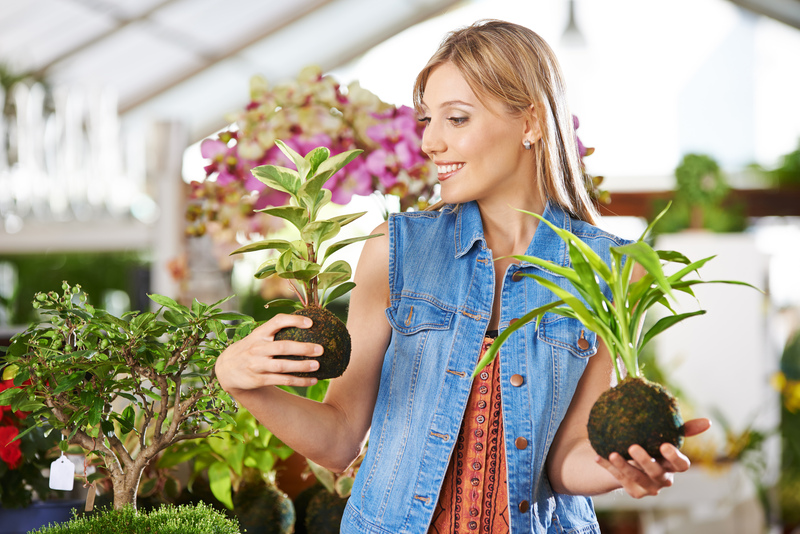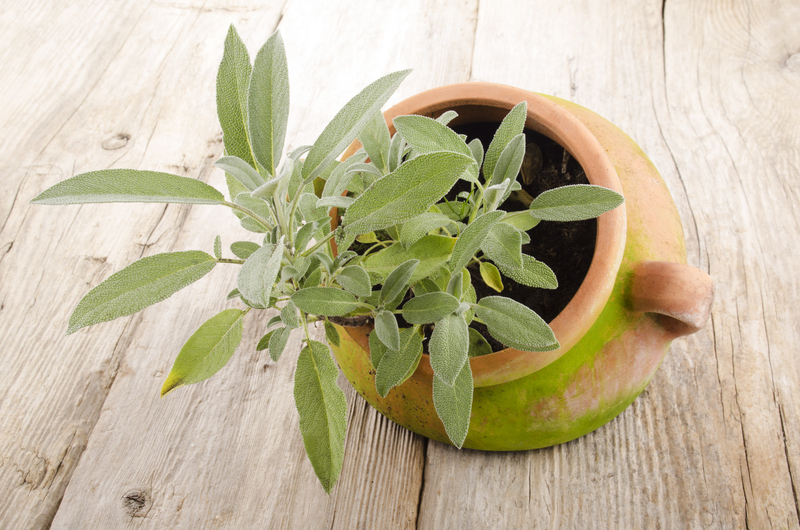Soil and Sustainability: Gardens in Climate Work
Posted on 11/09/2025
Soil and Sustainability: Gardens in Climate Work
Soil is more than dirt beneath our feet--it's a vital, living ecosystem that underpins much of life on Earth. As the conversation around climate change intensifies, sustainable gardening and soil management have taken on crucial roles in efforts to mitigate global warming. This article will comprehensively explore the connection between soil health, sustainable gardens, and their impact on climate change. Whether you are a seasoned gardener or just starting, understanding the role of soil in sustainability can empower you to make meaningful changes, both locally and globally.

Understanding the Role of Soil in Sustainability
What is Soil Sustainability?
Soil sustainability refers to the maintenance and enhancement of soil's capacity to support plant and animal life, regulate water, and store carbon, all while minimizing environmental damage. Sustainable soil management considers the long-term ability of the soil to perform these essential functions for current and future generations.
Why is Healthy Soil Important?
- Promotes robust plant growth - Healthy soil supplies necessary nutrients for crops and gardens.
- Improves biodiversity - Soil is home to a rich community of organisms, from microbes to earthworms, all vital for ecosystem health.
- Serves as a carbon sink - Healthy soil stores vast amounts of carbon, helping to counterbalance greenhouse gas emissions.
- Regulates water cycles - Good soil absorbs rainfall, reduces runoff, and prevents flooding or droughts.
Soil and Climate Change: The Crucial Connection
Soil as a Carbon Reservoir
One of soil's most important roles in sustainability and climate work is its ability to act as a carbon reservoir. Healthy, living soils actively store carbon dioxide taken from the atmosphere by plants. When organic matter decomposes, much of its carbon is retained in the soil, reducing greenhouse gases in the air.
According to scientists, the world's soils contain more carbon than the atmosphere and all plant life combined. Improving soil quality through sustainable gardening can help sequester additional carbon, making gardens powerful tools in climate change mitigation.
Impact of Degraded Soils on the Climate
When soils are overworked, eroded, or depleted through unsustainable practices, they lose their ability to store carbon and may even become sources of carbon release. This degradation increases atmospheric carbon dioxide, contributing to global warming. Soil erosion, deforestation, and intensive agriculture are leading causes of soil carbon loss.
Gardens as Tools for Sustainability and Climate Action
The Role of Sustainable Gardens in Climate Work
Gardens, especially when managed with sustainability in mind, can serve as localized solutions to the global problem of climate change. Here's why:
- Carbon sequestration - Plants absorb and store CO2, and sustainable practices maximize soil's carbon-storing capacity.
- Biodiversity havens - Gardens support pollinators, beneficial insects, and soil organisms, enhancing ecosystem resilience.
- Water conservation - Healthy soils retain more water, reducing the need for irrigation and curbing flood risks.
- Reduction of chemical inputs - Sustainable gardening avoids synthetic fertilizers and pesticides, reducing pollution and greenhouse gas emissions.
Types of Sustainable Gardens Contributing to Climate Solutions
- Permaculture gardens - Mimic natural ecosystems to improve soil health and store carbon.
- Organic gardens - Use natural composts and avoid synthetic inputs, maintaining living, fertile soils.
- Pollinator gardens - Support ecosystems and often use native plants that require fewer resources.
- Forest gardens - Layered planting systems that resemble natural forests, with high biodiversity and carbon storage capacity.
- Community gardens - Provide local food, reduce food miles, and promote environmental stewardship in urban settings.
Principles and Practices for Sustainable Soil Management
Principles of Regenerative Gardening for Soil Health
- Protect the soil surface year-round - Use mulch or cover crops to safeguard soil from erosion and temperature extremes.
- Encourage plant diversity - Grow a variety of species to support soil organisms and build soil resilience.
- Minimize soil disturbance - Practice low-till or no-till methods to preserve soil structure and microbial life.
- Recycle organic matter - Compost green waste back into the garden for nutrient cycling and improved soil texture.
- Integrate perennials - Deep-rooted perennial plants enhance soil structure and draw down carbon.
Best Practices to Improve Soil Sustainability in Your Garden
- Test Your Soil - Assess soil health through texture, nutrient analysis, and pH testing; tailor amendments accordingly.
- Feed the Soil, Not Just Plants - Apply compost, leaf mold, or well-rotted manure to enrich soil life.
- Plant Cover Crops - Grow legumes or grasses in off-seasons to fix nitrogen and boost organic matter.
- Practice Crop Rotation - Prevent nutrient depletion and manage pests naturally through rotation.
- Retain Water Wisely - Mulch and organic matter improve moisture retention and reduce evaporation.
- Avoid Synthetic Chemicals - Chemical fertilizers and pesticides can destroy beneficial microbes and harm soil structure.
- Encourage Wildlife - Attract birds, insects, and invertebrates for balanced ecosystems and natural pest control.
The Science of Soil Carbon Sequestration
How Soil Stores Carbon
Soil carbon sequestration is the process of capturing atmospheric carbon dioxide and storing it in soil organic matter. Plants absorb carbon dioxide during photosynthesis; some carbon becomes part of plant roots and is transported into the soil. Over time, as plant residues decay, soil organisms further break them down, stabilizing carbon within soil aggregates. This organic carbon can remain in the soil for decades or even centuries.
Practices such as adding compost, maintaining plant cover, and avoiding soil disturbance help maximize this process in home gardens, farms, and community green spaces.
The Benefits of Increased Soil Carbon
- Enhanced fertility - More organic matter supports healthy crops and landscapes.
- Increased water retention - Improved soil structure means gardens need less irrigation.
- Improved ecosystem resilience - Soils rich in organic matter are better able to withstand drought, pests, and disease.
- Long-term climate benefits - Soil carbon storage can be a durable solution to offset carbon emissions.
Challenges to Soil Sustainability
Threats to Healthy Soils
- Erosion - Removal of fertile topsoil due to wind or water.
- Soil compaction - Heavy machinery and over-cultivation destroy soil structure and biodiversity.
- Pollution - Chemicals and industrial runoff degrade soil quality and kill beneficial organisms.
- Loss of organic matter - Failing to replace what plants and microbes consume leaves soil depleted.
- Salinization - Excessive irrigation can make soils too salty for most plants.
Climate Change's Double-Edged Impact on Soil
Climate change not only receives impacts from soil but also threatens soil health itself. Extreme weather, rising temperatures, and changes in rainfall patterns can increase erosion, reduce organic matter, and diminish overall soil productivity. Adopting sustainable gardening practices is essential for both adapting to and combating these negative trends.
The Social and Economic Benefits of Sustainable Gardens
Building Community and Food Security
Community gardens and urban growing projects can transform vacant lots and underused spaces into vibrant food-producing assets. By managing these gardens sustainably, local residents can:
- Reduce dependence on distant, industrial food systems
- Promote healthier lifestyles and access to fresh produce
- Build climate resilience through local adaptation
- Strengthen community ties and environmental awareness
Economic Advantages of Healthy, Sustainable Soils
- Reduced costs - Fewer inputs (fertilizer, pesticides, water) are needed in well-managed soils.
- Increased yields - Healthy soils support more productive crops and efficient urban gardens.
- Long-term property value - Improved soils can increase urban and suburban property appeal.
- Job creation - Sustainable landscaping and urban agriculture generate green jobs locally.
Innovative Technologies and Research in Soil Sustainability
Emerging Techniques for Sustainable Soil Management
- Biochar - Charred organic material added to soil enhances carbon sequestration and soil fertility.
- Mycorrhizal fungi inoculation - Fungal partnerships boost plant growth and soil health.
- Soil sensors and smart irrigation - New technology helps gardeners optimize water use and monitor soil conditions.
- Green infrastructure - Rain gardens, green roofs, and bioswales combine beauty with sustainability and water regulation.
- AI and big data - Applications in soil health monitoring, crop selection, and management optimization are redefining sustainable gardening.
Research and Policy Support
Governments and research institutions increasingly recognize the importance of soil and sustainable gardens in broader climate strategies. Efforts include:
- Supporting soil conservation in agricultural policy
- Funding research into regenerative and organic agriculture
- Promoting urban gardening and green space development
- Educating the public on soil health and climate action
Tips for Gardeners: Building Climate-Resilient, Sustainable Gardens
- Get to know your soil - Conduct a soil test, observe its texture, smell, and drainage to understand its health.
- Prioritize organic matter - Add what you can: kitchen scraps, leaves, grass clippings, and composted manure improve both fertility and water retention.
- Plant densely and diversify - A mix of annuals, perennials, shrubs, and even small trees mimics natural systems and protects soil year-round.
- Limit soil disturbance - Use hand tools instead of tillers. Mulch between rows to suppress weeds and retain moisture.
- Design for water - Swales, rain gardens, and permeable surfaces ensure excess rainwater soaks into your garden beds instead of causing erosion or runoff.
- Embrace native plants - These plants are typically more adapted to local conditions and require less maintenance.
- Involve your community - Share successes, challenges, and resources for greater impact. Community gardens can multiply individual efforts.

The Future of Soil and Sustainability in Climate Work
Sustainable soil management and eco-friendly gardening are not just trending--they are becoming essential pillars of environmental responsibility and climate resilience. As the planet warms, every action that helps restore and protect soil health takes us a step closer to a sustainable future.
By managing our gardens as climate solutions--caring for the integrity of soil, increasing plant diversity, and minimizing chemicals--we become stewards of both our land and the broader environment.
Together, these efforts can create landscapes that not only feed our communities but also help balance Earth's climate, preserve biodiversity, and ensure that our precious soils remain fertile for generations to come.
Conclusion: Soil and Sustainability--Your Garden Can Change the World
Soil is the foundation of life, and sustainable gardens are quiet but powerful allies in the fight against climate change. By understanding and nurturing the relationship between soil, sustainability, and climate action, gardeners of every scale can play an immediate role in creating a resilient, healthy, and just world. Every handful of healthy soil matters. Start in your backyard, and watch your positive impact grow--one garden at a time.
Key Takeaways
- Soil health is essential for both food production and climate balance.
- Sustainable, climate-smart gardening improves carbon sequestration and biodiversity.
- Everyone can contribute--your gardening habits matter more than you think.
Let us work together for the soil beneath us and the climate above us, nurturing gardens that give back to the Earth and help secure a sustainable future for all.

